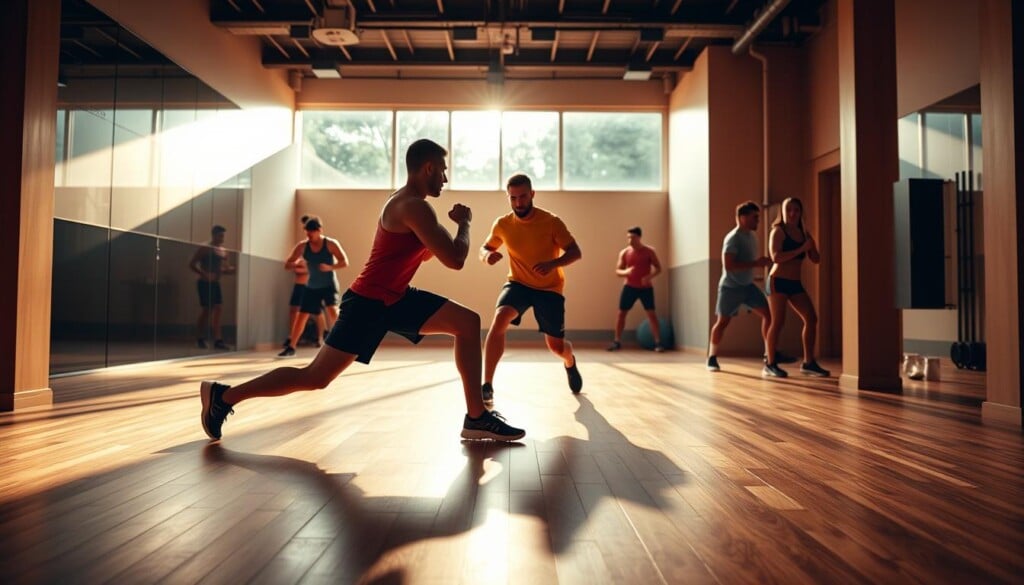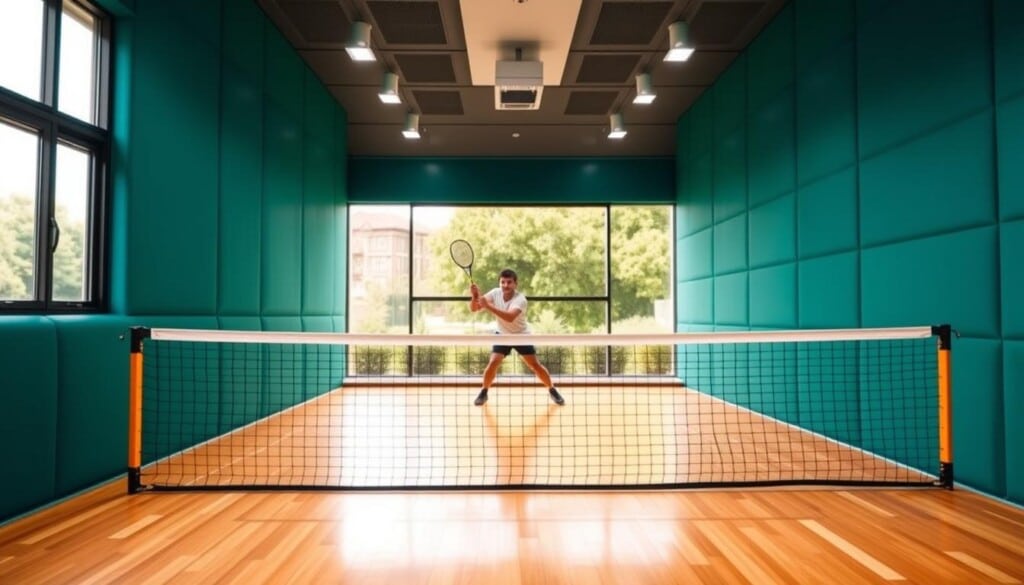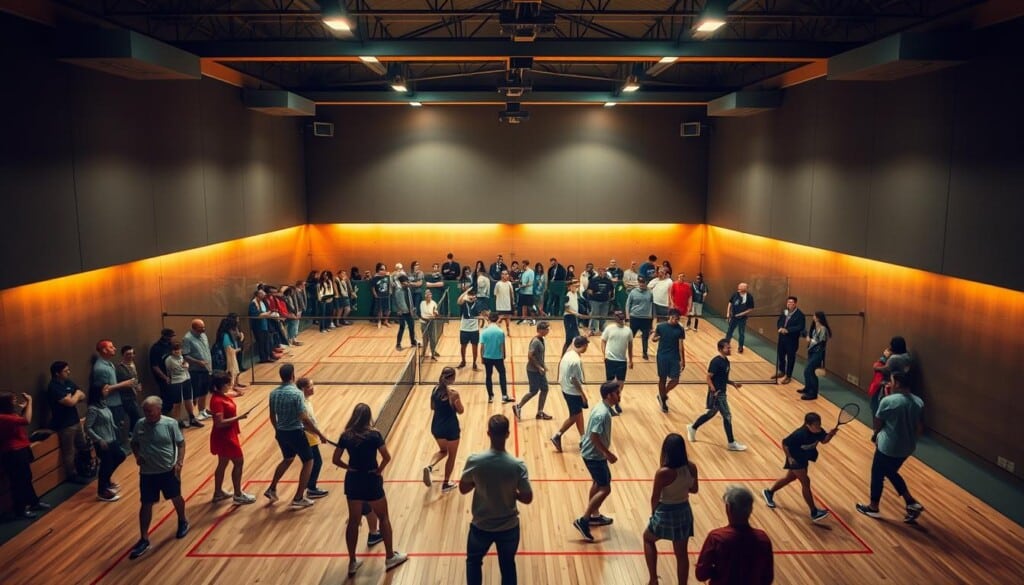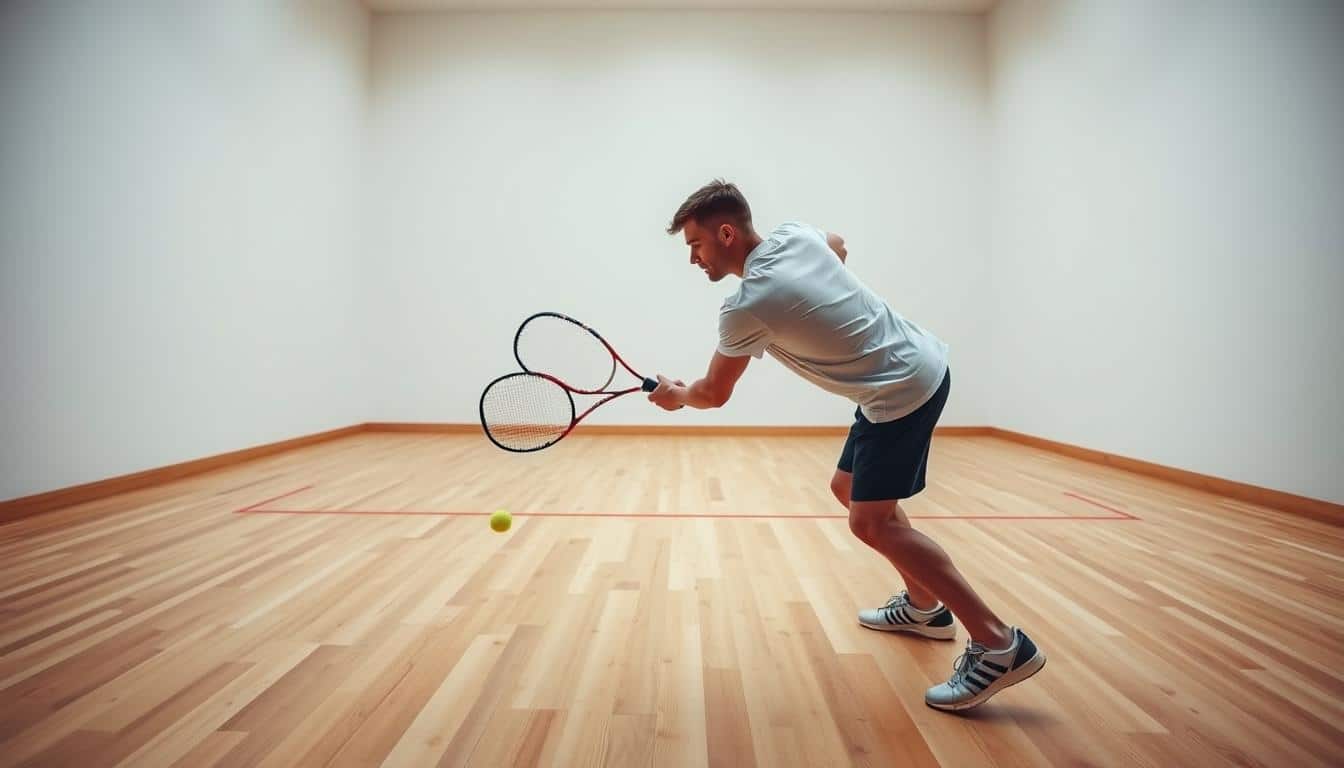Ever wondered why some beginners are great at squash while others find it tough? Getting the hang of this fast-paced sport can really change your game. This article is packed with tips and techniques for beginners looking to get better. You’ll learn the basics of playing squash, how to develop winning strategies, and how to connect with your local squash community.
Key Takeaways
- Learn the basic strategies of squash to enhance gameplay.
- Understand key techniques that are essential for beginners.
- Explore effective positioning and shot selection.
- Get tips on building endurance and strength for squash.
- Discover how local resources can support your squash journey.
Understanding the Basics of Squash
Squash is a fast-paced racquet sport played in singles or doubles. It’s set in a four-walled court. The game demands intense physical effort and strategic thinking, combining fitness with tactical skills. For newcomers, grasping the basics is key to diving into the sport.
What is Squash?
Squash involves two or four players hitting a small rubber ball against the front wall. It requires quick reflexes and the ability to predict opponents’ moves. Knowing the game’s basic rules is vital for building a strong foundation.
The Objective of the Game
The game’s goal is to hit the ball against the front wall so the opponent can’t return it before it bounces twice. Players aim to keep the rally going until their opponent fails to return the ball effectively. This shows how strategy and skill are essential.
Key Equipment Needed
Starting a squash journey requires the right equipment. Beginners need a lightweight racquet, a blue dot ball for beginners, and non-marking indoor court shoes. Knowing what gear to use prepares players for a fun and engaging game.
Essential Squash Techniques
Learning squash starts with mastering key techniques. These skills improve your game and make it more fun. We’ll cover grip and stance, basic shots, and why footwork is important.
Grip and Stance
A good squash grip is key for control and precision. It should form a V shape with your thumb and forefinger. This grip gives you flexibility and power.
Your stance is also critical. It lets you pivot easily. This makes it simple to reach for shots and move around the court.
Basic Shots to Master
Start by learning basic strokes like drives, volleys, and drop shots. Focus on being accurate, not just powerful. This helps you play consistently.
Mastering these shots is the first step to playing strategically. It lets you outsmart your opponents.
Importance of Footwork
Good footwork is essential for moving fast and positioning yourself right. Quick movements help you return to the “T” position easily. This is a big advantage on the court.
Improving your footwork boosts your performance and enjoyment of the game.
Squash Strategies for Beginners
Effective squash strategies are key for beginners. Learning to read your opponent, stay in the right position, and pick the right shots can really help. These basics help you understand the game better and play smarter.
How to Read Your Opponent
Knowing how to read your opponent is a big advantage. Beginners should watch for body language and shot patterns. This helps predict what your opponent will do next, making your game better.
Positioning on the Court
Good court positioning is important. Return to the “T” after each shot to cover more ground. This way, you’re ready to respond quickly to your opponent’s moves.
Effective Shot Selection
Mixing up your shots keeps your opponent guessing. Beginners should try different tactics like corner shots and strategic placements. This not only keeps the game interesting but also puts pressure on your opponent, giving you more chances to win.
Building Endurance and Strength
To get better at squash, you need to work on your fitness in different ways. This includes cardio, strength training, and flexibility exercises. Each one is important for playing your best on the court.
Cardiovascular Fitness for Squash
Doing cardio helps you stay strong and last longer in squash games. Running, cycling, or interval training are great. They help you keep your energy up during matches.
Strength Training Exercises
Working on your core and doing functional exercises is key. These help you move fast and strong on the court. Use light weights and do lots of reps to build endurance, not bulk.
Flexibility and Stretching Routines
Stretching regularly helps prevent injuries and makes you move better. Squash players should do dynamic stretches before playing and static stretches after. This helps with recovery and keeps you flexible.

Choosing the Right Squash Equipment
Finding the right equipment is key to improving your game on the squash court. Beginners should focus on picking the best squash racquets and shoes. Also, knowing how to maintain your gear is important to keep it in top shape.
Top Squash Rackets for Beginners
Beginners should look for lightweight racquets that balance power and control. Brands like Brio offer great options. They even let you try demo racquets to see if they’re right for you.
Choosing the right racquet boosts your confidence and skill on the court.
Selecting the Right Shoes
It’s important to wear non-marking, high-traction indoor shoes. They protect the court and keep you safe. Look for shoes made for quick movements, which are common in squash.
Good shoes help you move faster and stay stable, improving your game.
Importance of Proper Gear Maintenance
Keeping your racquets and shoes in good shape is essential. Regularly check your strings and grips. Replace them when needed.
Good maintenance makes your gear last longer and perform better. This ensures you can play your best game.
Finding Local Squash Courts and Clubs
Exploring local squash courts and clubs is key to improving your game. Resources like LocalZ make finding nearby courts easy. They also help you connect with the squash community. Joining a club not only boosts your skills but also builds friendships.
Local Resources for Squash Enthuasiasts
Platforms like LocalZ help squash fans find courts that fit their needs. These directories give insights into clubs and facilities. They help you connect with others in the squash world.
How to Join a Squash Club
Joining a squash club opens up new opportunities. Clubs offer different membership levels, from casual to competitive. This way, players can find the right fit and grow their skills in a supportive setting.
Tips for Meeting Fellow Players
Getting involved in leagues, classes, or tournaments strengthens community bonds. These activities improve social skills and offer valuable experiences. They help build friendships and rivalries in the squash community.

Improving Your Squash Skills
To get better at squash, you need to practice, watch others, and get help from coaches. Doing drills, watching pro matches, and getting coaching are key steps. They help you grow as a player.
The Value of Practice and Drills
Practicing regularly is key to getting better at squash. Doing specific drills helps you improve your shot accuracy and movement. These drills make your skills automatic and boost your confidence when playing.
Watching Professional Squash Matches
Watching pro squash matches can teach you a lot. Sites like YouTube show top-level play. This lets you learn from the best and improve your game.
Seeking Coaching and Lessons
Getting a certified coach can really help. They tailor lessons to fit your needs, focusing on your weak spots. A good coach helps you use your strengths better, making you a better player.
Joining the Local Squash Community
Being part of a local squash community adds fun and support to the game. Players enjoy the company and support from others. LocalZ helps find places to play and meet new friends.
Leveraging LocalZ for Connections
LocalZ makes it easy to find places to play squash and meet others. It helps players find practice buddies or join group sessions. This way, everyone can enjoy the game more.
Benefits of Community Engagement
Being part of a squash community makes the game more enjoyable. It builds teamwork and support among players. This support keeps players motivated and excited to improve.
Organizing Local Tournaments
Hosting squash tournaments locally gives players a chance to compete. These events add excitement and grow the squash culture. They also offer chances to meet new people and keep the community active.

Final Thoughts on Your Squash Journey
Starting your squash journey is just the beginning. It takes time to get better. Every small step, like mastering a new shot, is important.
Seeing failures as chances to learn helps a lot. It keeps you excited about playing squash.
Embracing the Learning Process
Small wins can really inspire you. Celebrating every improvement keeps you motivated. It shows that all your hard work is paying off.
Every time you beat a tough opponent or master a new move, you feel more determined. This is what keeps you going.
Celebrating Small Wins
Staying motivated is essential for success. Setting goals and sticking to a training plan helps a lot. It keeps you focused on improving.
Support from friends and coaches also boosts your motivation. It creates a positive environment where everyone can grow together.

